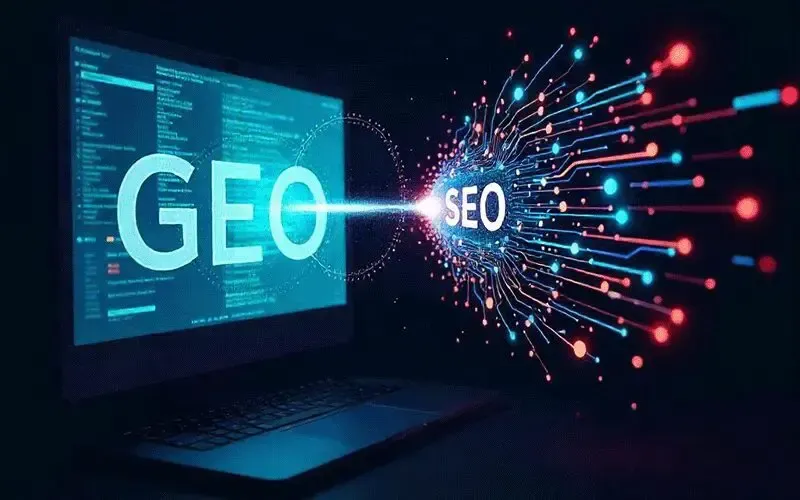SEO in the Age of AI: How to Optimize for Generative Search
Summary
Search is changing. As Google’s Search Generative Experience (SGE), Bing Chat, and tools like Perplexity AI deliver more direct, AI-generated answers, companies need to rethink their SEO strategies to stay visible. This emerging approach is called Generative Engine Optimization (GEO)—a method of crafting content that AI systems prioritize in their responses.
In this post, you'll learn:
- How AI-powered search engines are transforming SEO—and how GEO differs from classic SEO
- Why traditional SEO techniques still matter, but need to be extended
- What new requirements GEO introduces—structured data, entity recognition, author expertise, and direct answers
- Which AI tools can support SEO workflows (e.g., ChatGPT, NeuronWriter, Surfer SEO, Frase, Semrush, Screaming Frog with GPT)
- How aiSuite helps create secure, SEO-optimized content with built-in prompt templates and a GDPR-compliant infrastructure
- BONUS: A practical SEO audit prompt for ChatGPT
The Rise of Generative Search: What It Means for SEO
With Google SGE and other AI-driven features, search engines are becoming answer engines. Google now responds with AI-generated summaries instead of just listing links. Bing’s GPT-4 powered chat experience allows natural language queries with immediate, conversational responses. Platforms like Perplexity AI combine traditional indexing with AI to generate sourced answers on the fly.
This shift means websites must now optimize not just for rankings, but for inclusion in AI-generated content. Studies show that GEO techniques significantly increase the chance of being included in AI responses. However, there’s also a downside: if users get their answers directly, fewer may click through to websites. SEO is evolving from optimizing for blue links to optimizing for AI snippets.
What is Generative Engine Optimization (GEO)?
GEO focuses on optimizing content for generative AI systems that synthesize search results into direct answers. Think beyond blue links — the goal is to become part of the AI's output.
Where traditional SEO aims to rank pages, GEO aims to train AI models to select your content when generating answers.
Why Classic SEO Still Matters?
GEO doesn’t replace classic SEO — it builds upon it. You still need:
- Keyword optimization
- On-page best practices (title tags, headers, clean structure)
- Fast, mobile-friendly pages
- High-authority content and backlinks
In fact, many of these fundamentals are prerequisites for being surfaced in SGE or AI-generated summaries. Content still needs to be crawlable, indexable, and trustworthy.
AND good content is still the foundation. GEO just adds another layer.
What changes with GEO?
To be featured in AI-generated answers, your content should be:
- Structured: Use FAQ sections, bullet points, and clear headlines.
- Entity-rich: Mention recognizable people, organizations, and topics (following Google’s E-E-A-T guidelines)
- Machine-readable: Add structured data (Schema.org) like Article, FAQPage, HowTo, Person, and Organization.
- Author-identified: Show expertise via author bios, credentials, and consistent content publishing.
- Direct-answer ready: Content should answer specific questions clearly in the first few lines.
Pro Tip: Phrase subheadings as questions (e.g., “What is GEO?”) and answer them directly in the paragraph below.

SEO-Ready AI Tools You Should Know
Here are some top tools that help bridge classic SEO with GEO:
- ChatGPT (with GPT-4): For content generation, idea prompts, keyword clustering, and competitor analysis.
- NeuronWriter / Surfer SEO: AI-assisted tools to analyze SERPs and optimize semantic coverage.
- Frase.io: Generates outlines and ranks questions users ask online.
- Semrush & ContentShake: SEO data and AI-assisted writing in one platform.
- Screaming Frog + GPT integration: Perform audits and automatically fix missing meta tags or generate schema.
These tools help accelerate content creation and optimization workflows — but they must be paired with strategy.
How aiSuite Enhances SEO in a Secure Way
aiSuite offers a unique advantage for organizations that require both performance and compliance:
- Secure infrastructure: GDPR-compliant, Swiss-hosted or private cloud deployments.
- SEO-friendly AI content generation: Built-in prompt templates ensure proper structure and keyword use.
- Workflow-optimized: Teams can co-create content, review, and publish directly.
- Internal Knowledge Integration: aiSuite can tap into your internal knowledge base, enabling it to create content that reflects your company's specific terminology, industry context, and tone of voice.
- No AI silos: All content generated stays within the secured platform and can be centrally managed.
This makes aiSuite ideal for enterprises that need high-quality SEO content without compromising on data governance — and ensures that every article sounds on-brand and industry-relevant.
BONUS: A Practical SEO Audit Prompt for ChatGPT
You can use this prompt to audit your SEO performance:
You're an SEO expert. Please analyze the page at [URL] for the following:
- On-page SEO (title, meta, headers, content quality, keyword use)
- Technical SEO (speed, mobile, indexability, structure)
- Off-page SEO (backlink profile, mentions, social signals)
List concrete improvements for each category.
Replace [URL] with your blog post or landing page, and let ChatGPT give you a detailed improvement plan.
Conclusion: GEO is the Future of Search
SEO is evolving fast. With AI-generated search results on the rise, the competition is no longer just for first position — it’s to be the answer.
To succeed:
- Keep SEO fundamentals strong
- Add GEO layers: structure, clarity, and authorship
- Use secure and purpose-built tools like aiSuite
Get in touch to explore how aiSuite helps you generate high-quality, SEO- and GEO-ready content in a secure environment.
Ready to boost your content visibility — even in the AI age? Book a free strategy call with our aiSuite experts today.
What is Generative Engine Optimization (GEO)?
Generative Engine Optimization (GEO) is a new approach to search engine optimization tailored for AI-generated content. It aims to increase the visibility and relevance of your content in the era of AI-powered search engines.
How is GEO different from traditional SEO?
GEO focuses on optimizing content for AI systems and how they interpret it. While traditional SEO relies on keywords and backlinks, GEO considers the structure and context of content to improve its chances of being featured in AI-generated answers.
What role does AI play in generative search engine optimization?
AI systems now generate direct answers in search results. To be selected as a source, content must be clear, trustworthy, and structured — aligning with how large language models (LLMs) process information.
How can I ensure my content is optimized for GEO?
Use structured headings, FAQs, and bullet points. Include schema markup, clearly identify your authors, and answer questions directly. Align your content with user intent and provide clear, concise answers.
What are the advantages of GEO compared to traditional SEO?
GEO increases the chances of your content being directly featured in AI-generated answers, improving visibility even when users don’t click on traditional search links.
What are common mistakes when applying GEO?
- Focusing only on keywords without clear structure
- Ignoring structured data and schema markup
- Lacking author credibility or source transparency
- Writing overly complex or jargon-heavy content
How will GEO change the future of SEO?
SEO is shifting from "ranking" to "responding". The goal is not just to rank on page one, but to be the answer in AI-generated responses. GEO will be a key driver of future visibility.
What does the rise of GEO mean for my marketing strategy?
You’ll need to rethink content creation — from format to tone to structure. High-quality, AI-friendly content will become a competitive advantage in brand visibility and lead generation.





